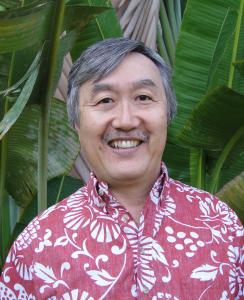Tsuchiyama named deputy director of the NDPTC
University of Hawaiʻi at MānoaRay Tsuchiyama has been named deputy director of the National Disaster Preparedness Training Center (NDPTC), a research and training center at the College of Social Sciences in the UH Mānoa Department of Urban and Regional Planning. He will oversee strategic mission and operations for the center, and reports to NDPTC’s executive director Karl Kim, PhD.
“Ray brings unique in-depth management, technology, university and Asia-Pacific background to NDPTC,” said Kim, who is also a UH Mānoa urban and regional planning professor and chair of the National Domestic Preparedness Consortium. “After our successful training of more than 16,000 first responders, planners, state and local officials, and others involved in disaster response and recovery in more than 200 cities across the U.S, and with Ray’s skill set and background, we can execute on new initiatives to take NDPTC to the next level.”
Said Tsuchiyama, “I am honored to join NDPTC with its vital mission of training in disaster preparedness, response and recovery. This unique center is at the forefront of the interdisciplinary approach of science and policy regarding natural disasters with the goal of building resilient communities.”
The NDPTC is a member of the National Domestic Preparedness Consortium (NDPC), which was expanded in 2007 to address all-hazards capabilities by the addition of the University of Hawai`i. Established by Congress in 1998, the National Domestic Preparedness Consortium is comprised of universities and federal agencies involved with homeland security, hazard mitigation and building resilience across the nation.
The NDPTC is authorized to develop and deliver training and educational programs related to homeland security and disaster management, with a specific focus on natural hazards, coastal communities, and the special needs and opportunities of islands and territories. The NDPTC actively engages internally with FEMA and UH, as well as with external partners across the region to integrate the delivery of its trainings, products and services.
Tsuchiyama was most recently director of institutional advancement at UH Foundation. Before returning to Hawai‘i after the 2011 Great East Japan Earthquake, he was head of the Asia Office for the Massachusetts Institute of Technology and held executive roles with Analog Devices and AOL Time Warner. In the 1980s in Honolulu he was with Castle & Cooke and Mitsui Real Estate.
The National Domestic Preparedness Consortium (NDPC) is a professional alliance sponsored through the U.S. Department of Homeland Security and the FEMA National Preparedness Directorate. NDPC’s mission is to enhance the preparedness of federal, state, local and tribal emergency responders and teams, including non-governmental organizations and the private sector. Its aim is to reduce the nation’s vulnerability to incidents involving weapons of mass destruction, terrorism and all-hazard high-consequence events by developing, delivering and assessing plans, training, technical assistance and exercises. Consortium members include: Center for Domestic Preparedness in Anniston, AL; Energetic Materials Research and Testing Center at New Mexico Tech; National Center for Biomedical Research and Training at Louisiana State University; Texas A&M Engineering Extension Service National Emergency Response and Rescue Training Center; National Nuclear Security Administration/CTOS-Center for Radiological/Nuclear Training; National Disaster Preparedness Training Center at the University of Hawai‘i at Mānoa; and National Center for Emergency Response for Surface Transportation in Pueblo, CO.
The National Disaster Preparedness Training Center (NDPTC) is a member of the National Domestic Preparedness Consortium, which was expanded in 2007 to address all-hazards capabilities by the addition of the University of Hawai‘i. The NDPTC is authorized to develop and deliver training and educational programs related to homeland security and disaster management, with a specific focus on natural hazards, coastal communities and the special needs and opportunities of islands and territories. The NDPTC actively engages internally with FEMA and the University of Hawai‘i, as well as with external partners across the region to integrate the delivery of its trainings, products and services
The Department of Urban and Regional Planning in the College of Social Sciences at the University of Hawai‘i at Mānoa fosters a multidisciplinary set of intellectual and practical tools to improve the quality of life for present and future generations, both locally and globally, through planning, public policy and social collaboration.
The College of Social Sciences (CSS) at the University of Hawai‘i at Mānoa is engaged in a broad range of research endeavors that address fundamental questions about human behavior and the workings of local, national and international political, social, economic and cultural institutions. Its vibrant student-centered academic climate supports outstanding scholarship through internships, and active and service learning approaches to teaching that prepare students for the life-long pursuit of knowledge.

